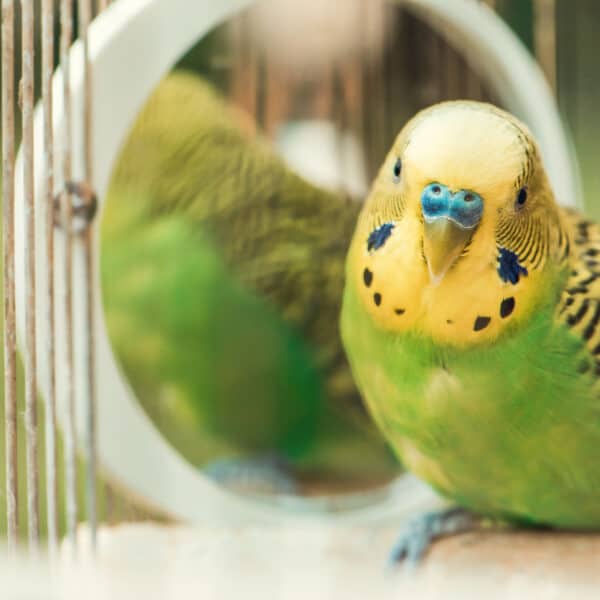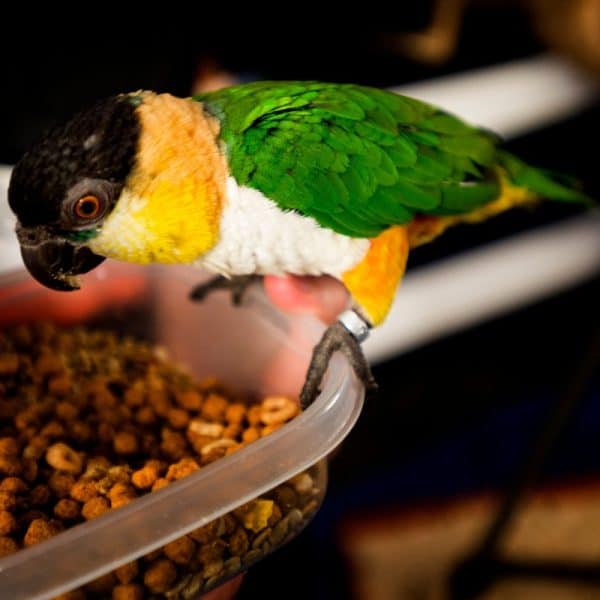Last Updated on by Mitch Rezman
Birds are masters of disguise when it comes to hiding illness. In the wild, showing signs of weakness can make them a target for predators.
This natural survival instinct often leads domesticated birds to mask symptoms of illness until they become severe.
As a bird owner, understanding the subtle signs of illness and knowing when to act is crucial for your bird’s well-being.
Common Signs of Illness in Birds
- Changes in Appetite or Drinking Habits
- Eating or drinking less than usual, or complete refusal to eat.
- Increased thirst, may indicate underlying issues like kidney disease or diabetes.
- Picking at food but not actually eating it.
- Changes in Droppings
- Diarrhea, overly watery droppings, or droppings with an unusual color or consistency.
- Blood in the droppings or a lack of fecal material.
- An unusually strong or foul odor from droppings.
- Feather and Skin Issues
- Ruffled or unkempt feathers that aren’t smoothed out.
- Persistent over-preening, feather plucking, or bald patches.
- Swelling, redness, or crusting on the skin.
- Changes in Behavior
- Uncharacteristic lethargy or excessive sleeping.
- Sitting at the bottom of the cage or not perching properly.
- Sudden aggression or a change in temperament.
- Lack of vocalization or reduced interest in interacting.
- Respiratory Distress
- Open-mouth breathing or tail bobbing while breathing.
- Wheezing, clicking, or other unusual respiratory sounds.
- Discharge from the nostrils or crusty nares.
- Physical Abnormalities
- Swollen or closed eyes, or a dull look in the eyes.
- Discharge from the eyes or beak.
- Lumps, bumps, or visible injuries.
- Weakness in legs or difficulty standing.
Preventative Measures to Keep Birds Healthy
- Weigh your bird regularly: Rapid swings in weight can indicate a possible illness.
- Provide a Balanced Diet: Ensure your bird receives species-appropriate food, including pellets, fresh fruits, vegetables, and occasional treats.
- Maintain Cleanliness: Regularly clean the cage, perches, and feeding dishes to prevent bacterial or fungal growth.
- Offer Mental and Physical Stimulation: Provide toys, foraging activities, and out-of-cage time to keep your bird mentally and physically healthy.
- Ensure Proper Housing: The cage should be appropriately sized, with safe perches and enough room for natural behaviors.
- Monitor Environment: Avoid drafts, sudden temperature changes, and exposure to toxins like non-stick cookware fumes or cigarette smoke.
- Regular Checkups: Schedule annual visits with an avian veterinarian to catch any potential issues early.
When to Consult a Veterinarian
If you notice any of the signs listed above, do not delay in consulting an avian veterinarian. Birds’ health can decline rapidly, so early intervention is key. Contact your vet immediately if:
- Your bird is showing respiratory distress or difficulty breathing.
- There is significant weight loss or your bird appears extremely thin.
- You notice injuries, bleeding, or broken feathers.
- There is no improvement in behavior or appearance after a day of monitoring.
Final Thoughts
Being a vigilant observer of your bird’s health is one of the best ways to ensure they live a long, happy life.
Subtle changes in your bird’s behavior, droppings, or physical appearance can be the first signs of illness. With proper care, prevention, and prompt veterinary attention, you can help your feathered friend thrive.
Remember, when in doubt, it is always better to err on the side of caution and consult a veterinarian.
Author Profile
Latest entries
 Feeding Exotic BirdsDecember 29, 2025How to Switch or Convert Your Bird From Seeds to Pellets: Real-Life Case Studies and Practical Guidance
Feeding Exotic BirdsDecember 29, 2025How to Switch or Convert Your Bird From Seeds to Pellets: Real-Life Case Studies and Practical Guidance Feeding Exotic BirdsDecember 16, 2025A Practical, Budget-Smart Guide to Feeding Birds Well
Feeding Exotic BirdsDecember 16, 2025A Practical, Budget-Smart Guide to Feeding Birds Well Bird EnviornmentsDecember 7, 2025Understanding Budgie Cage Bar Orientation: Myths, Realities & Practical Solutions for Vertical-Bar Bird Cages
Bird EnviornmentsDecember 7, 2025Understanding Budgie Cage Bar Orientation: Myths, Realities & Practical Solutions for Vertical-Bar Bird Cages Feeding Exotic BirdsDecember 5, 2025How Dr. T.J. Lafeber Rewrote the Future of Pet Bird Nutrition
Feeding Exotic BirdsDecember 5, 2025How Dr. T.J. Lafeber Rewrote the Future of Pet Bird Nutrition



